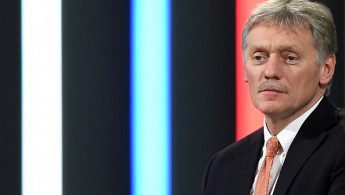Kremlin dismisses mass burial discoveries as 'lies'
The Kremlin on Monday denied its forces were responsible for large-scale killings in east Ukraine and accused Kyiv of fabricating its discoveries of mass graves in recaptured territory.
In the latest incident spurring fears of an atomic emergency, Ukraine said that Russian rockets landed precariously close to a nuclear power station in southern Ukraine.
Ukraine recaptured Izyum and other towns in the east this month, crippling Kremlin supply routes and bringing fresh claims of Russian atrocities with the discovery of hundreds of graves -- some containing multiple bodies.
"These are lies," Kremlin spokesman Dmitry Peskov told reporters on Monday. Moscow, he said, "will stand up for the truth in this story."
Fighting in the northeast has raged and AFP journalists heard artillery exchanges in frontline Kupiansk on Monday, as traumatised civilians headed out of the town now mainly in Ukrainian hands.
The streets were strewn with broken glass, spent cartridge casings and the discarded remains of ration packs issued by both forces.
Most of the fire is outgoing, with Ukrainian tanks and artillery targeting Russian positions on the west side of the town, over a mess of broken bridges. A column of smoke rose in the distance.
At the entrance to the town, cowering from the sounds of Ukrainian tank shells passing overhead towards Russian lines, civilians gathered to hitch rides or join buses to head out into safer Ukrainian territory.
"It was impossible to stay where we were living," said 56-year-old Lyudmyla, who braved the constant crack of shells to cross the Oskil river from the disputed east bank to the relative safety of the west.
"There was incoming fire not just every day, but literally every hour. It's very tough there, on the other bank of the river."
In his address to the nation on Monday, Ukrainian President Volodymyr Zelensky said the Russians were "panicking" as his forces hold recaptured territory in the northeastern Kharkiv region.
'Lost a lot of blood'
Russian-backed authorities in east Ukraine said a "punitive" strike by Kyiv's forces had killed more than a dozen people and wounded more in the separatist stronghold of Donetsk.
The rebel head of the region claimed the strike was "deliberate" and said it would "not go unpunished."
A court in the neighbouring rebel-held region of Lugansk meanwhile sentenced two employees of the Organization for Security and Cooperation in Europe to 13 years on treason charges.
OSCE chairman Zbigniew Rau condemned the "unjustifiable" detention of the mission's members since the outbreak of the war, calling it "nothing but pure political theatre... inhumane and repugnant".
Ukrainian civilians in the Kharkiv region have recounted months of brutality under Russian occupation.
In Kupiansk, Mykhailo Chindey told AFP he had been tortured on suspicion of supplying targeting coordinates to Ukrainian forces.
"One person was holding my hand and another one was beating my arm with a metal stick. They were beating me up two hours almost every day," he told AFP.
"I lost consciousness at some point. I lost a lot of blood. They hit my heels, back, legs and kidneys," he said.
Ukraine's nuclear energy agency, Energoatom, said Russia struck the Pivdennoukrainsk nuclear power plant overnight, with a "powerful explosion" just 300 metres (985 feet) from its reactors.
The strike damaged more than 100 windows at the station, but the reactors were not damaged, Energoatom said, publishing photos of glass shattered around blown-out frames.
It also released images of what it said was a two-metre-deep crater from where the missile landed. No staff were wounded, it said.
'Russia endangers the whole world'
Attacks around Ukrainian nuclear facilities have spurred calls from Ukraine and its Western allies to de-militarise surrounding areas.
Europe's largest atomic facility -- the Zaporizhzhia nuclear plant in Russian-held territory in Ukraine -- has become a hot spot for concerns after tit-for-tat claims of attacks.
The UN's atomic agency deployed a monitoring team to the site in early September after new fighting.
Early in the February invasion, fighting erupted around Chernobyl in the north, where an explosion in 1986 contaminated swathes of the surrounding territory.
"Russia endangers the whole world. We have to stop it before it's too late," Zelensky said early Monday.
The Mykolaiv region in southern Ukraine, where the Pivdennoukrainsk plant is located, is close to the frontline of a Ukrainian counter-offensive.
Kyiv's forces have clawed back territory near Mykolaiv, nearing the strategically important hub of Kherson.
Russian forces have continued to shell Ukrainian-held towns near the frontlines.





 Follow the Middle East's top stories in English at The New Arab on Google News
Follow the Middle East's top stories in English at The New Arab on Google News


